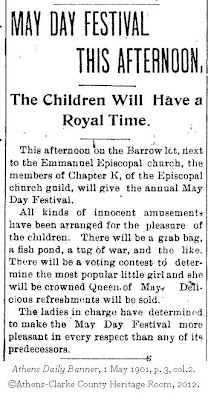On this day in 1912, the Weekly Banner offered the following editorial about the need for Athens to have more playgrounds:
(click to enlarge image)
Improved school playgrounds and the establishment of a city park were part of Mayor H. J. Rowe's play as he came into his second term in January, 1912. Stories that year from around the nation noted cities putting an emphasis on parks and play space for their children, including a "Recreation Congress" in Chicago that was called for by the Playground and Recreation Association of America, a group that included social worker Jane Addams and progressive muckraking journalist Jacob Riis at the helm.
In June, the Civic League, an organization of prominent Athens women, sent a letter to the Chamber of Commerce about the need to create more playgrounds and parks in town before the property became too valuable. In July, reports that the Civic League were working to have school playgrounds remain open during the summer, so children would have somewhere to play that was near their homes, were also published and supported by the newspaper. These attempts were, however, unsuccessful.
Learn More:
- Weekly Banner, Jan. 1912 - Dec. 1914 on Microfilm in the Heritage collection.
- Athens Historic Newspaper Archive collection in the Digital Library of Georgia.
- Politics and Parks: Chicago Businessmen and the Recreation Movement by Michael P. McCarthy in the Journal of the Illinois State Historical Society via JSTOR.
- How to Design and Build Children's Play Equipment by Jay Beckwith, et al, in the general collection.
- Child: How Children Think, Learn, and Grow in the Early Years by Desmond Morris in the New Books collection.
- Playground Politics: Understanding the Emotional Life of Your School-Aged Child by Stanley Greenspan in the general collection.
- Children, Play, and Development by Fergus P. Hughes in the children's Parenting collection.
- "The playground of today is the republic of tomorrow": Social Reform and Organized Recreation in the USA, 1890-1930 by Linnea M. Anderson on infed.org.
- The Backyard Playground: Recreational Landscapes and Play Structures by Creative Publishing International in the general collection.
- Einstein Never Used Flashcards: How Our Children Really Learn, and Why They Need to Play More and Memorize Less by Kathy Hirsh-Pasek and Roberta M. Golinkoff in the general collection.
- Children's Traditional Games: Games from 137 Countries and Cultures by Judy Sierra and Robert Kaminsky in the children's Reference collection.






